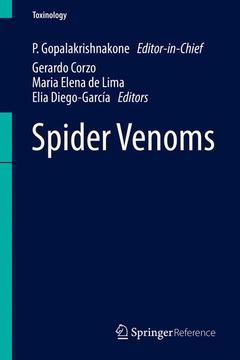Spider Venoms, 1st ed. 2016 Spider Venom Toxinology Series

This volume provides an overview of the biochemical characterization, structure-function studies, proteomics, bioinformatics, molecular biology, transcriptomics and genomics of various spider species. The book also covers our current knowledge of venom components, toxins and their modes of action. The first section of Spider Venom includes contributions regarding the wide diversity of spider venom components and depicts some of their biological effects (antimicrobial, ion channel modulators, insecticides, this includes peptide and non-peptide toxins), and emphasizes spiders of public health importance. The second section covers transcriptomes, proteomes (and peptidomics), bioinformatics and molecular dynamics. The last section describes antimicrobial, insecticidal toxins, envenomation and the medical potential of spider venoms.
Spider venoms are a great and extensive source of bioactive compounds, and as such form a boundless and bountiful area awaiting discovery. Itis by virtue of dedicated scientists that new toxins are discovered and that new insights arise, leading the way towards the investigation of their pharmacological effects, and hopefully, as a consequence, arriving at the discovery of venom components as new drug candidates.
Prof. P. Gopalakrishnakone, M.B.B.S., Ph.D., F.A.M.S., D.Sc., is presently professor of anatomy and chairman of the Venom and Toxin Research Programme at Yong Loo Lin School of Medicine, National University of Singapore. He is also a consultant to the Defence Science Organization in Singapore and adjunct senior research scientist at the Defence Medical Research Institute. Prof. Gopalakrishnakone is an honorary principal fellow at the Australian Venom Research Unit, University of Melbourne, Australia. His research studies include structure function studies, toxin detection, biosensors, antitoxins and neutralization factors, toxicogenomics and expression studies, antimicrobial peptides from venoms and toxins, and PLA2 inhibitors as potential drug candidates for inflammatory diseases. The techniques he employs include quantum dots to toxinology, computational biology, microarrays, and protein chips. Prof. Gopalakrishnakone has more than 160 international publications, four books, about 350 conference presentations, and 10 patent applications. He has been an active member of the International Society on Toxinology (IST) for 30 years and was president from 2008 to 2012. He is also the founder president of its Asia Pacific Section, a council member, as well as an editorial board member of Toxicon, the society’s official journal. His research awards include the Outstanding University Researcher Award from the National University of Singapore (1998); Ministerial Citation, NSTB Year 2000 Award in Singapore; and the Research Excellence Award from the Faculty of Medicine at NUS (2003). His awards in teaching include Faculty Teaching Excellence Award 2003/4 and NUS Teaching Excellence Award 2003/4. Prof. Gopalakrishnakone also received the Annual Teaching Excellence Award in 2010 at both university and faculty levels.
Dr. Gerardo A. Corzo was born in Chiapas, Mexico, and he studied biochemical engineeri
Date de parution : 05-2015
Disponible chez l'éditeur (délai d'approvisionnement : 15 jours).
Prix indicatif 294,22 €
Ajouter au panierDate de parution : 03-2016
Ouvrage de 450 p.
15.5x23.5 cm
Disponible chez l'éditeur (délai d'approvisionnement : 15 jours).
Prix indicatif 316,49 €
Ajouter au panier


